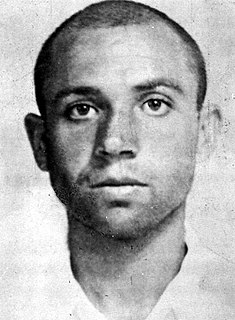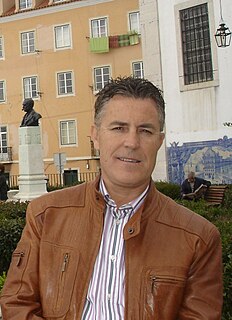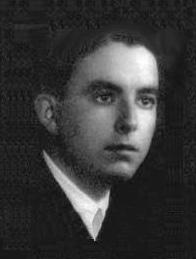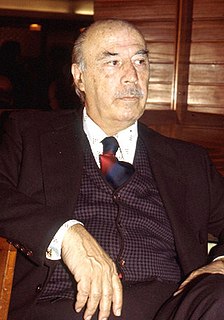
Emilio Prados (4 March 1899 - 24 April 1962) was a Spanish poet and editor, a member of the Generation of '27.

Emilio Prados (4 March 1899 - 24 April 1962) was a Spanish poet and editor, a member of the Generation of '27.
Born in the Andalusian city of Málaga in 1899, Prados was offered a place at Madrid's famous Residencia de estudiantes in 1914 and moved into its university section in 1918. Here he met Lorca, Dalí, Buñuel and many other young people who were to become celebrated and influential figures in Spanish art and literature.
In 1921 a long-running lung complaint forced him to retire to a sanatorium in Davosplatz, Switzerland, where he spent most of the year. In this enforced seclusion from wider society he read widely in European literature and settled upon becoming a writer himself. Emerging from the sanatorium in 1922, he resumed his academic training: taking courses at the universities of Freiburg and Berlin; visiting museums and art galleries across Germany; immersing himself in the artistic culture of Paris and meeting, amongst others, Pablo Picasso.
In the summer of 1924 he returned to Málaga, where he continued writing. Together with Manuel Altolaguirre he founded the magazine Litoral, one of the most influential literary and artistic publications of 1920s Spain. In 1925 he became an Editor for the Sur printing-house, again working closely with Altolaguirre. Sur was responsible for publishing most of the work of the Generation of '27, and the quality of their editing brought Prados and Altolaguirre international prestige.
At the same time as he was working in literature and pursuing his own creative talents, Prados took an increasing interest in social affairs and politics, particularly the marginalisation of the poorest sectors of society. The climate of violence in Málaga after the outbreak of the Spanish Civil War in 1936 led him to return to Madrid, where he joined the Alianza de Intelectuales Antifascistas and began contributing enthusiastically to the intellectual side of the Republican cause. As well as publishing his own works (his compilation of war poetry, Destino fiel, won the National Literature Prize in 1938), he edited various books including Homenaje al poeta Federico García Lorca and Romancero general de la guerra de España.
He moved to Barcelona in 1938 and took charge, again with Altolaguirre, of the publications of the Republican Ministry of Public Instruction. However, as a prominent Republican he was soon forced to flee Spain altogether as the Nationalists won victory in the Civil War. He escaped to Paris and then, early in July 1939, in the company of a variety of other intellectual Republican figures, to Mexico, where he lived until his death in 1962.
Early work, 1925 - 1928: Prados's poetry highlights in particular the relationship between the natural world and the otherness of being, mixing avant-garde and surrealist elements with his own Arabic/Andalusian roots.
Political poetry, 1932 - 1938: Prados devotes himself to outspokenly social and political poetry, developing these themes using surrealist language.
Poetry from exile, 1939 - 1962: Prados's later poetry carries a profound sense of rootlessness and solitude. Thematically his work becomes much denser and more philosophical, addressing the complexity of concepts such as new life, solidarity and love.

Luis Cernuda Bidón was a Spanish poet, a member of the Generation of '27. During the Spanish Civil War, in early 1938, he went to the UK to deliver some lectures and this became the start of an exile that lasted till the end of his life. He taught in the universities of Glasgow and Cambridge before moving in 1947 to the US. In the 1950s he moved to Mexico. While he continued to write poetry, he also published wide-ranging books of critical essays, covering French, English and German as well as Spanish literature. He was frank about his homosexuality at a time when this was problematic and became something of a role model for this in Spain. His collected poems were published under the title La realidad y el deseo.

Miguel Hernández Gilabert was a 20th-century Spanish-language poet and playwright associated with the Generation of '27 and the Generation of '36 movements. Born and raised in a family of low resources, he was self-taught in what refers to literature, and struggled against an unfavourable environment to build up his intellectual education, such as a father who physically abused him for spending time with books instead of working, and who took him out of school as soon as he finished his primary education. At school, he became a friend of Ramón Sijé, a well-educated boy who lent and recommended books to Hernández, and whose death would inspire his most famous poem, Elegy.

Federico del Sagrado Corazón de Jesús García Lorca, known as Federico García Lorca, was a Spanish poet, playwright, and theatre director. García Lorca achieved international recognition as an emblematic member of the Generation of '27, a group consisting mostly of poets who introduced the tenets of European movements into Spanish literature.
The Generation of '27 was an influential group of poets that arose in Spanish literary circles between 1923 and 1927, essentially out of a shared desire to experience and work with avant-garde forms of art and poetry. Their first formal meeting took place in Seville in 1927 to mark the 300th anniversary of the death of the baroque poet Luis de Góngora. Writers and intellectuals paid homage at the Ateneo de Sevilla, which retrospectively became the foundational act of the movement.

Rafael Alberti Merello was a Spanish poet, a member of the Generation of '27. He is considered one of the greatest literary figures of the so-called Silver Age of Spanish Literature, and he won numerous prizes and awards. He died aged 96. After the Spanish Civil War, he went into exile because of his Marxist beliefs. On his return to Spain after the death of Franco, he was named Hijo Predilecto de Andalucía in 1983 and Doctor Honoris Causa by the Universidad de Cádiz in 1985.

León Felipe Camino Galicia was an anti-fascist Spanish poet.

Jorge Guillén Álvarez was a Spanish poet, a member of the Generation of '27, a university teacher, a scholar and a literary critic.
This article concerns poetry in Spain.
Manuel Altolaguirre was a Spanish poet, an editor, publisher, and printer of poetry, and a member of the Generation of '27.

Ian Gibson is an Irish author and Hispanist known for his biographies of the poet Antonio Machado, the artist Salvador Dalí, the bibliographer Henry Spencer Ashbee, the filmmaker Luis Buñuel. and particularly his work on the poet and playwright Federico García Lorca, for which he won several awards, including the 1989 James Tait Black Memorial Prize for biography. His work, La represión nacionalista de Granada en 1936 y la muerte de Federico García Lorca was banned in Spain under Franco.
Panamanian literature comprises the whole of literary works written in Panama. The first literature relating to Panama can be dated to 1535, with a modern literary movement appearing from the mid-19th century onwards

Francisco Morales Lomas is a poet, novelist, playwright, essayist and literary critic and member of the Generation of Transition. His poetry has been defined as a faithful representative of human solidarity, for his personal commitment and aesthetic values.
Luis Rosales Camacho was a Spanish poet and essay writer member of the Generation of '36.
Concepción Méndez Cuesta was a leading Spanish poet and dramatist and member of the Generation of '27 who became known in the literary world under the name Concha Mendez.
José Luis Cano was a Spanish writer, editor and literary critic. He co-founded the literary review Ínsula in 1947. In 1948, he co-founded and edited the Adonais Poetry Collection which gives the Adonais Prize for Spanish poetry. Luis Cano was awarded the Gold Medal for Merit in Fine Arts from the King of Spain in 1985.

Luis García Montero is a Spanish poet and literary critic, as well as a professor of Spanish Literature at the University of Granada.

José María Hinojosa Lasarte was a Spanish writer and political militant. As a man of letters he is considered one of the first if not the very first and the only genuinely surrealist poet in Spain, counted also among members of Generation ‘27. As a politician he acted in ultra-conservative realm, holding Carlist jefatura in Málaga and building Andalusian structures of the Agrarian party. Following more than half a century of oblivion, his memory and especially the circumstances of his death became a counter-reference to these of Lorca and are subject to politically-charged discussions.
Orfila Bardesio was a Uruguayan poet and educator.

Guillermo Diaz-Plaja was a Spanish literary critic, historian, essayist, and poet.
A number of works have been based on, have been inspired by, or have alluded to the works of Spanish poet, playwright, and theatre director Federico del Sagrado Corazón de Jesús García Lorca.